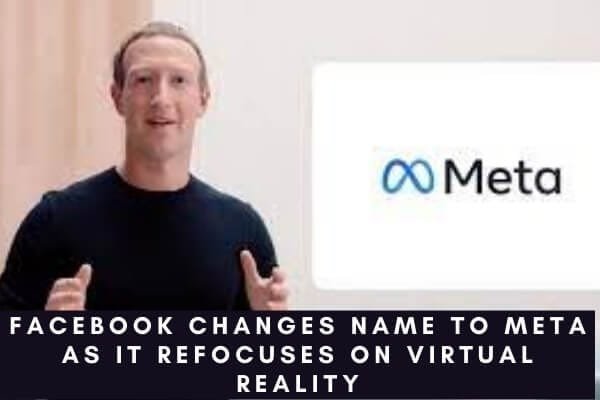In this screengrab from a video posted on Thursday, Facebook CEO Mark Zuckerberg addresses the crowd during a live-streamed virtual and augmented reality conference to announce the rebranding of Facebook as Meta.
According to the firm’s Thursday announcement, Facebook Inc will now be known as Meta, which emphasizes developing the “metaverse,” a shared virtual environment that it believes will one day take the place of mobile internet.
The name change is intended to reflect the company’s mission of connecting people through technology. The move comes as Facebook faces allegations from lawmakers and regulators regarding its market power, algorithms, and policing of abuse on its platforms.
The digital world often referred to as the “metaverse,” will be known as the metaverse or “other worlds.” Facebook’s CEO Mark Zuckerberg announced that the company’s new name reflected its work investing in other realms rather than its namesake social media service, which would be called Facebook.
The metaverse is a term coined in the 1980 novel “Snow Crash” and has gained interest in Silicon Valley since then. It refers to the concept of a shared virtual realm that may be accessed by people from all over the world using various devices.
“Our brand is so closely linked to one product that it can’t possibly represent everything we’re doing today, much less in the future,” Zuckerberg added.
Microsoft announced that it will change its name to “Xbox” on March 1, 2019. The transition is part of the company’s strategy to focus more on artificial intelligence and mixed reality. It said the change would integrate its many apps and technologies under one new brand. It also stated that it would not alter its corporate architecture in any way.
Google has recently come under increased scrutiny from global lawmakers and regulators.
The latest row began when whistleblower and former Facebook employee Frances Haugen leaked papers, claiming that the firm prioritized profit over user safety. She has testified before a US Senate committee and lawmakers in the UK’s Parliament in recent weeks. Zuckerberg earlier this week dismissed claims made from the documents as being “misleading.”
On December 1, Tesla said it plans to begin trading under the new stock ticker it has reserved, MVRS, intending to make an eventual transition to TSLA. On Thursday, it unveiled a new sign at its headquarters in Menlo Park, California, replacing its thumbs-up “Like” logo with a blue infinity shape.
On Thursday, Facebook shares were up 1.5 percent at $316.92 per share.
On Thursday, outside Facebook’s headquarters in Menlo Park, visitors pose with a freshly unveiled logo for “Meta,” the new name for Facebook’s parent firm.
Tarnished reputation
This week, Facebook announced that its hardware division, Facebook Reality Labs, responsible for AR and VR efforts, will become a separate reporting unit. Its investment in it will result in a $10 billion decrease in operating profit this year..
The company established a product team dedicated to the metaverse in this branch this year to develop it. It also recently unveiled plans to employ 10,000 workers in Europe over the next five years to work on the project.
“I’m not thinking about quitting,” Zuckerberg said in an interview with tech publication the Information. “I haven’t really thought very seriously about separating this unit yet.”
According to a Thursday statement from its head, the company will now be known as Reality Labs, Andrew “Boz” Bosworth. The firm will also abandon the use of the Oculus brand for its VR headsets in favor of “Meta” devices.
However, rebranding is not Facebook’s first. In 2019, it introduced a new logo to distinguish the business from its social software platform.
Over the last several years, numerous blows have been delivered to Snap’s reputation, including its management of user data and monitoring abuses such as health misinformation, violent speech, and hate speech. The FTC has also filed an antitrust lawsuit against the company alleging anti-competitive behavior.
“While a name change may help alleviate confusion by differentiating Facebook’s parent firm from the app that started it, the problems that have plagued the company can’t be promptly erased,” said Mike Proulx, research director at Forrester.
The company’s decision to remove the Facebook name even from products like the video-calling device Portal demonstrates its eagerness to avoid additional attention. Prashant Malaviya, a marketing professor at Georgetown University McDonough School of Business, said that the move aims to mitigate the potential damage caused by the unprecedented scrutiny on its other apps.
He added: “Without a doubt, (the Facebook name) is definitely harmed and poisonous.”
“Beyond”, which is also the name of Facebook’s new cryptocurrency, is meant to reflect there is always more to build. Twitter CEO Jack Dorsey on Thursday tweeted out a different definition “referring to itself or to the conventions of its genre; self-referential.”
“It’s not what it used to be,” Mark Zuckerberg told his adoring audience at the F8 developer conference. “We’re changing our name to reflect that many people connect using other services rather than Facebook, and over time, they won’t need to use Facebook at all.”
In 2015, Google was restructured to form a new holding company called Alphabet Inc.. The famous search engine expanded into new areas such as self-driving cars, fast internet, and cloud computing. In 2016, Snapchat rebranded as Snap Inc., just as it debuted its first line of smart glasses.
This year, Facebook debuted its own pair of smart glasses with Ray-Ban, announcing a slew of new AR and VR product updates at Connect. These included the ability to call friends on Facebook Messenger using the Oculus Rift and the option to invite others to a social version of their home, dubbed ” Horizon Home.”
During his presentation, Zuckerberg invited the audience to view a short video of what the metaverse may look like, with users connecting as avatars and being whisked away to digital versions of different locations and eras. The metaverse will require innovation in terms of security and privacy, he remarked.
